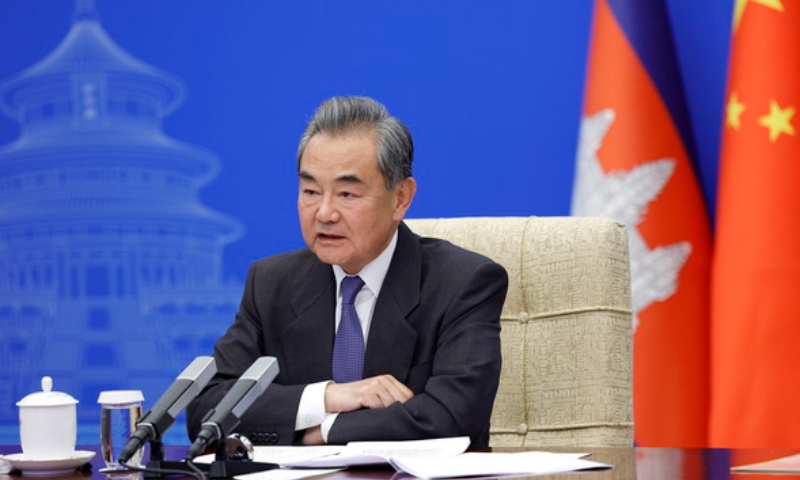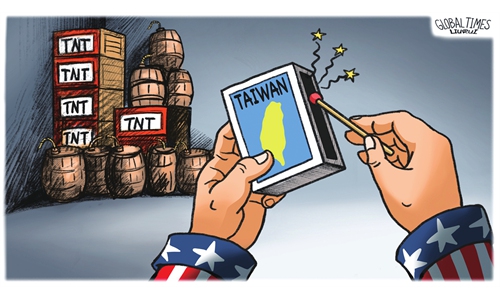Wang Yi has no plan to meet Blinken during ASEAN meetings amid tensions caused by Pelosi’s trip to Taiwan island

Chinese State Councilor and Foreign Minister, Wang Yi Photo: fmprc.gov.cn
Chinese State Councilor and Foreign Minister Wang Yi has no plans to meet with US Secretary of State Antony Blinken although both are attending the 55th ASEAN Foreign Ministers' Meeting and related meetings in Phnom Penh this week, Chinese Foreign Ministry spokesperson Hua Chunying announced on Tuesday, as tensions rise over Speaker of the US House of Representatives Nancy Pelosi's visit to Taiwan island.
The decision is seen by observers as a signal that reflects the severity of the visit, as well as China's outrage toward US provocations.
Wang is scheduled to attend meetings with foreign ministers from ASEAN and East Asian countries from Wednesday to Friday, which will focus on regional security and development, as well as how to cope with rising uncertainties that come with COVID-19, the Russia-Ukraine crisis, and the US pushing its Indo-Pacific strategy that threatens regional stability.
Wang will attend the ASEAN-China Foreign Ministers' Meeting, ASEAN Plus Three Foreign Ministers' Meeting, East Asia Summit Foreign Ministers' Meeting, and a foreign ministers' meeting of the ASEAN Regional Forum from Wednesday to Friday in Phnom Penh, Cambodia, Hua announced.
Wang will also pay a visit to Cambodia at the invitation of Cambodian Deputy Prime Minister and Foreign Minister Prak Sokhonn, Hua added. She revealed that Wang is going to meet and exchange opinions with foreign ministers from countries including Laos, Brunei, Japan, Sri Lanka and New Zealand on issues of common concern, and that Wang has no plan to meet Blinken, who is also scheduled to participate in the US-ASEAN Ministerial Meeting, the East Asia Summit Foreign Ministers' Meeting, and the ASEAN Regional Forum from Wednesday to Friday.
Chinese experts see the lack of a meeting between Wang and Blinken as demonstrating the severity of Pelosi's visit, and China's anger over US' provocation.
"There's no need for Wang to meet and talk with Blinken anymore. We've said what we need to say, did what we should do… the US has received all information it needs, but Blinken insisted on making wrong comments," Zhang Tengjun, deputy director of the Department for Asia-Pacific Studies at the China Institute of International Studies, told the Global Times.
Giving remarks to reporters during a press conference at the UN headquarters in New York on Monday, Blinken said that "If the speaker does decide to visit [Taiwan] and China tries to create some kind of crisis or otherwise escalate tensions, that would be entirely on Beijing," Blinken said. "We are looking for them, in the event she decides to visit, to act responsibly and not to engage in any escalation going forward."
In response, Hua said at Tuesday's conference that the world sees clearly that it is the US who started the provocation first and caused tension, thus the US should take full responsibility for the situation.
She also called out Blinken's remarks for showing US hegemony and gangster logic, which is "I can challenge you at my will, but you cannot oppose nor defend yourself."
Zhang noted that what the US Secretary of State said showed he has no sincerity, no desire to listen to China, and that it has totally ruined the atmosphere for a possible meeting between Blinken and Wang.
This week's events are the first in-person meetings between foreign ministers from ASEAN countries after a two-year hiatus due to the COVID-19 pandemic, the Straits Times reported. It said that ASEAN foreign ministers will also meet their counterparts from 11 key dialogue partners this week - Australia, Canada, China, the European Union, India, Japan, New Zealand, South Korea, Russia, the UK and the US.
Experts said the succession of meetings come amid a peculiar backdrop when regional countries are facing bumps in the road due to COVID-19 and the Ukraine crisis, in addition to the pressure they face as the US pushes its Indo-Pacific strategy.
When asked about China's expectations for the series of meetings, Hua said that China's cooperation with ASEAN and East Asian countries are continuing their great momentum. China always sees ASEAN as an important force in maintaining regional stability and promoting integration of the regional economy.
China hopes the series of meetings can solidify the consensus of all parties, strengthen cooperation among all countries and inject a new impetus to region's peace and stability, Hua said.
Xu Liping, a research fellow on Southeast Asian studies at the Chinese Academy of Social Sciences in Beijing, said that ASEAN should play the role of mediator during the turbulent situation, as it will not be easily swayed by certain countries and always sticks to strategic autonomy. This stance, Xu said, can help the region and the world to use cooperation instead of confrontation.
Experts believe Pelosi's visit is overshadowing the meetings, as well as ASEAN and East Asian countries' long-cherished peace and stability. Pelosi, who began her Asia trip on Monday in Singapore and Malaysia, will also travel to South Korea and Japan.
Xu called this trip a "trip of trouble, and inappropriate political farce," as hyping the Taiwan question when Ukraine crisis is yet to be solved is detrimental for regional stability.
ASEAN and East Asian countries value peace and stability more than anything else, because this is what guarantees the region's rapid development, according to Xu, noting that those countries see Pelosi's visit as throwing the region into big uncertainty.
When meeting with Pelosi on Monday, Singapore Prime Minister Lee Hsien Loong highlighted the importance of stable US-China relations for regional peace and security to the US delegation, Reuters quoted Singapore's foreign ministry as saying.


